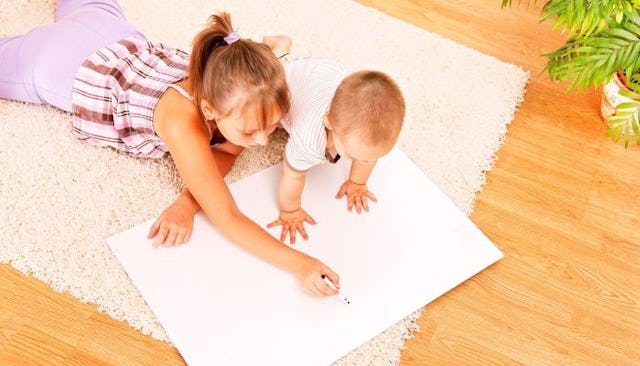7 Things Only Parents Of Age-Gap Children Can Understand

If, like me, you dreamed of having more kids, but after one or two thought “Shit, this is hard,” and put the brakes on, you might be a candidate to have an Age-Gap Kid.
Age-Gap Kids are born when shell-shocked, tired, overwhelmed and financially devastated parents pull themselves up out of the trenches and finally get around to the other child they wanted; or like me, they reach the point of no return because they’re that age already.
Age-Gap Kids have much older siblings—mine were eight and 10 years older—and they provide challenges that you don’t encounter when your children are close in age.
1. They grow up real quick.
Age-Gap Kids have got a long way to go to catch up with their older brothers and sisters, and they throw themselves at it full steam ahead. Their exposure to older-kid activities (yes, mine is that child who said the first swear word in preschool because she heard her hotheaded 14-year-old brother use it) means they’ll be wise beyond their years. You’re going to do a lot of explaining to a 3-year-old why she can’t wear a bra or makeup like her big sister and how it’s really not okay to watch Two and a Half Men at age 5.
2. They have extra ‘sibling parents.’
Your older children will consciously and unconsciously parent your baby too. This has its ups and downs. As your baby grows, they can help with minding, feeding and entertaining their “pet” sibling, but it spills over to saying no, teaching manners and dealing with tantrums or defiance. Beware: Too many people laying down the law can make for frustrated and rebellious toddlers.
3. It’s like having a first child all over again (in some respects).
We’d already given our baby paraphernalia away, so we joined the new parents buying equipment and sacrificed our spare room to make it into a nursery. Your Age-Gap Kid will receive the same intensity of attention your firstborn did—they’ll have an extended captive audience of you and your other children waiting to applaud and marvel at their every move. You will also spend a lot of time alone with your little one because your older kids will be busy (or just not interested in visiting the petting zoo).
4. You have less patience for kid stuff.
We’d been watching cartoons, taking our kids to the park, hosting playdates and eating nuggets for a decade by the time No. 3 came along. We still do all of these things, but less often and a bit less enthusiastically. On the other hand, greater financial stability has enabled us to take the family on more foreign holidays and to concerts, activities and restaurants that we couldn’t afford in our young family days.
5. You skip the crap.
You’ve got a lot of parenting scars and qualifications under your belt after raising two kids, and you know what to stress about in the first years and what to let slide. I skipped baby yoga and toddler sports classes. I took the advice of teachers and doctors in proportion, knowing we’ve got the important stuff covered.
6. You have to be flexible.
Outings and vacations with a 14-year-old, a 12-year-old and a 4-year-old mean being pulled in three directions, especially if you have a mix of boys and girls. We usually split up for age-appropriate activities and meet up later, or let the teens sleep late while we hit the pool with our youngest to burn off energy.
7. You have to bridge the gap.
You can’t take it for granted that your older kids will have patience to be around a screaming baby, a whiny toddler or an annoying grade-schooler when they are cool tweens and teens. You can’t expect that they will know how to bridge the gap on their own. Family meals work well for keeping everyone in touch, bowling is always an option, and my younger girls love to cheer on their football-playing brother.
Having another child after a long break brings a new dynamic into your home, one that you will never regret, along with lots of new parenting lessons. For your older kids, it teaches them how to put aside their own needs and listen and be responsive to others. It also provides them with another chance to be a kid, to play hide ‘n’ seek, or rough and tumble with their little brother or sister and earn lots of giggles, love and adoration in return. Or you could just get a dog!
This article was originally published on